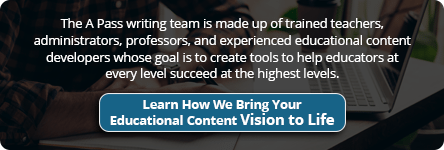“American Schools vs. the World: Expensive, Unequal, Bad at Math”–The Atlantic
“Wake-Up Call: U.S. Students Trail Global Leaders”–nbcnews.com
“Obama Administration Spent Billions to Fix Failing Schools, and It Didn’t Work”–The Washington Post
The list of objectives for educators at all levels seems to have no end:
- increasing access to high-quality education
- closing achievement gaps
- raising graduation rates
- preparing students to excel in a globalized economy
- keeping pace with rapid educational reform
Creating new educational content to enhance choice, keep students engaged, and measure growth is vital. But if they are continuously asked to do more with less, how can educators keep pace?
One answer is, simply, with help. Professional educational content writers use their expertise to develop tools that any superintendent, curriculum manager, and content developer can use. The objective is to facilitate educators in reaching their goals. And it’s those in the field who have had experience with successful students that know how to help students succeed.
These writers can develop courses, curricula, and assessments that not only meet objectives (defined by the university, state, or classroom teacher) but also interest students. They know how to make the content relevant to students. They make it fun but don’t skimp on rigor. Teachers, professors, and curricula developers plan, work with students, and manage millions of other tasks. And educational content writers provide the building blocks educators need to put their plans into effect.
Not every Internet contributor has the skills to be an effective educational content writer. What are the essentials in identifying a writer who can truly help create quality educational tools?
- Practical Education Experience
First-hand experience counts. Unless you’ve studied collaborative learning techniques or engrained Maslow’s Hierarchy into your thinking, it’s difficult to communicate well with teachers–or through them, to students. Only those who’ve stood in a 300-seat lecture hall full of students who rarely look up from their phones understand how important it is to make material interesting. Having written your own lesson plans or faced standardized tests creates an automatic connection with educators. Writers who’ve assimilated concepts like depth of knowledge and benchmark objectives are better able to produce the quality of writing educators need and students deserve.
- Expertise in Grammar and Style
Nothing undermines credibility like a mistake. Not all teachers teach English. But they all are professionals who understand the importance of polished writing. If teachers read something that makes them want to reach for their red pens, they are unlikely to trust the material. The best educational content writers not only know how to avoid mistakes but also are flexible enough to adapt to different style guides or other in-house requirements.
- Timely Delivery
You can’t rush quality; or maybe you can. Educational content writers understand the need to respond to changes at the school, district, or even national level. Effective educators analyze data from assessments and turn it into tools for improvement. If too much time passes between evaluation and implementation, whatever materials you create will be off target. Educators need writers who deliver content on time–and who are able to handle revisions quickly too.





